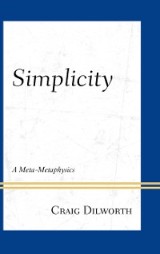Details

Simplicity
A Meta-Metaphysics|
104,99 € |
|
| Verlag: | Lexington Books |
| Format: | EPUB |
| Veröffentl.: | 01.11.2012 |
| ISBN/EAN: | 9780739177242 |
| Sprache: | englisch |
| Anzahl Seiten: | 180 |
DRM-geschütztes eBook, Sie benötigen z.B. Adobe Digital Editions und eine Adobe ID zum Lesen.
Beschreibungen
<span><span><span>Simplicity affords a new way of thinking about philosophical matters. In this book, the dualistic, true/false approach of formal logic is replaced by a three-part basis for thought. This basis consists of the simplicity categories of reason: simplicity, complexity, and nothingness. The category of simplicity is paradoxical, that of complexity is unproblematic, and that of nothingness is self-contradictory. These categories are to be applied to ontological categories, such as those of substance, self, or causality, thereby providing a clarification of the philosophical issue in question. The notion of perspective is integral to the simplicity way of thinking. A particular entity − such as the self − may be conceived as simple in one perspective, while being complex or nothing in another. Combined with the categories of simplicity, the notion of perspective is used to reveal a type of conceptual conflict that differs from contradiction. So, for example, the simplicity way of thinking better represents the relation between competing scientific theories − such as the wave and particle theories of radiation − as a form of perspectival incompatibility, rather than contradiction. From this basis, the book moves on to the distinction between two forms of simplicity: analytic and synthetic, which can respectively be conceived of as a point, and as a whole. Again the notion of perspective is employed: what is analytically simple in one perspective may well be synthetically simple in another. The application of the simplicity way of thinking to philosophy (as well as to other areas, such as mathematics and physics), of which there are many examples in this book, enhances our understanding by illuminating the conceptual relations involved in intellectually problematic situations.</span></span><br><span></span></span>
<span><span><span>Simplicity</span><span> provides a new logic with which to approach intellectual situations. Using the simplicity way of thinking as a tool helps clarify intellectual standpoints and conceptually problematic situations in philosophy, mathematics and physics.</span></span></span>
<span><span><span>List of Principles and Definitions</span></span><br><span><span>Foreword </span></span><br><span><span>Chapter 1: What is Philosophy?</span></span><br><span><span>Chapter 2: Simplicity</span></span><br><span><span>Chapter 3: Various Kinds of Category and Principle</span></span><br><span><span>Chapter 4: Ontology vs. Epistemology</span></span><br><span><span>Chapter 5: Understanding vs. Knowledge</span></span><br><span><span>Chapter 6: Fundamental Conceptual Principles</span></span><br><span><span>Chapter 7: Non-Physical Dimensions</span></span><br><span><span>Chapter 8: Language</span></span><br><span><span>Chapter 9: Set Theory</span></span><br><span><span>Chapter 10: Paradox </span></span><br><span><span>Chapter 11: Empiricism vs. Rationalism </span></span><br><span><span>Chapter 12: Empiricism vs. Realism</span></span><br><span><span>Chapter 13: The Special Theory of Relativity</span></span><br><span><span>Chapter 14: Quantum Mechanics</span></span><br><span><span>Chapter 15: God</span></span><br><span><span>Chapter 16: Ethics</span></span><br><span><span>Chapter 17: Love, Death, and Aesthetics </span></span><br><span><span>Chapter 18: Buddhist Philosophy</span></span><br><span><span>Chapter 19: Taoist Philosophy</span></span></span>
<span><span><span>Craig Dilworth, Canadian by birth, received his PhD at Uppsala University, Sweden, where he is presently Reader in Theoretical Philosophy. His work has included creating and running various environmental projects, as well as purely academic studies in metaphysics, philosophy of science, human ecology, theoretical physics, theoretical biology, and the social sciences. He is the author of two major works in the philosophy of science, Scientific Progress (1981; 4th ed. 2008) and The Metaphysics of Science (1996; 2nd ed. 2007), as well as, most recently, a book in human ecology entitled Too Smart for Our Own Good (2009).</span></span></span>

















